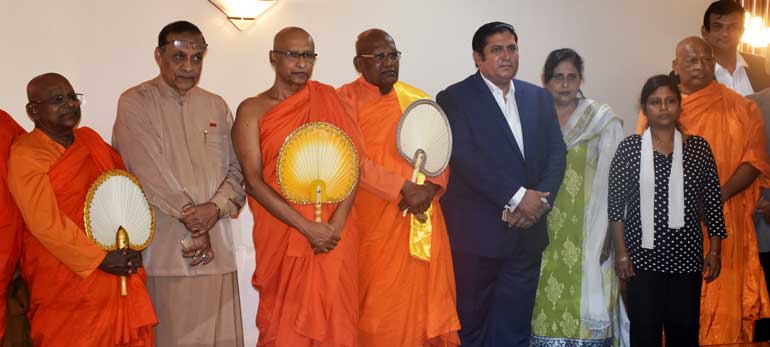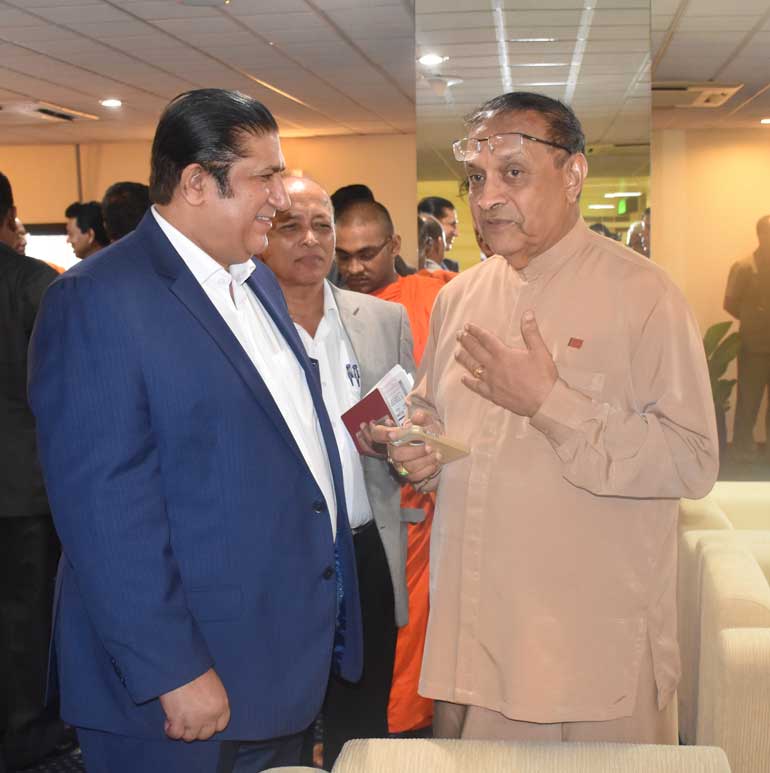Thursday Feb 26, 2026
Thursday Feb 26, 2026
Saturday, 23 April 2016 00:00 - - {{hitsCtrl.values.hits}}

Karu Jayasuriya and Dr. Sipra with senior delegates

Karu Jayasuriya with DHM Dr. Sipra

Karu Jayasuriya with the delegates and Deputy High Commissioner of Pakistan
A high-level delegation of 40 high ranking Sri Lankan Buddhist monks as well as eminent Buddhist scholars led by Speaker of the Sri Lankan Parliament Karu Jayasuriya left for Pakistan last evening for a week-long visit from 18 to 25 April.
The delegation comprises senior monks of all Buddhist chapters including Most Ven. (Dr.) Ittpahane Dhammalankara Nayake Thero, Kotte Sri Kalyani Samagri Dharma Maha Sangha Sabha, Daharmavijayaloka Maha Viharaya, Most Ven. Tirikunamale Ananda Maha Nayake Thero, Head of Ampara Chapter, Ven. Naranpanawe Ananda Thero, Deputy Registrar of Asgiriya Chapter, Kandy, Most Ven. (Dr.) Niayangoda Vijithasiri Anunayuake Thero, Malwatte Chapter, Kandy, Most Ven. Banagala Upatissa Thero, President of Maha Bodhi Society of Sri Lanka, Ven. Pathberiye Wimalagnana Thero, Chief High Priest of Ratnapura, Acting Nilame of Sri Dalada Maligawa (Temple of Sacred Tooth Relic) Sri Dalada Maligawa, Rev. Dr. Magammana Pagnananda Thero, Head of the Department of Pali and Buddhist University of Sri Jayewardenepura, Prof. Nimal de Silva, President National Trust of Sri Lanka, Dr. M. Ganeshamoorthy, Secretary Ministry of National Integration and Reconciliation, Manel Rabindranath Dela, Acting Nilame of Sari Dalada Maligawa (Temple of Sacred Tooth), International Relations of Sri Dalada Maligawa, Kandy, Preshantha Gunawardana, Director General, Central Cultural Fund of Sri Lanka, Rev. Lewwanduwe Chandawmala Thero, Sri Dharmavijeyaloka Maha Viharaya, Rukmale.
The Minister of Budha Sasena, Justice and Labour Relations Dr. Wijedasa Rajapaksa joined the delegation in Islamabad as the deputy leader of the delegation.
The visit aims to introduce the rich Buddhist Gandhara heritage of Pakistan to the people of Sri Lanka as well as to revive the Gandhara trail which has its capital and cultural hub at the present day Taxilla. The Gandhara trail was part of the silk route and many Buddhist pilgrims from different countries used to visit these sites on this historical route.
The delegation will be visiting different sites of Buddhist spiritual and religious significance in Mardan, Takht-i-Bahi and Swat, besides visiting Lahore, Taxila and Peshawar Museums, which are home to some of the rarest historical Buddhist holy relics.
The delegates will also call on the top political leadership including President of Pakistan, Chairman Senate, Speaker National Assembly, Minister for Religious Affairs, Special Assistant to Prime Minister on Foreign Affairs, Governors of Punjab, KPK and Sindh provinces besides meeting other high level officials.
During their stay in Pakistan, the delegation will also visit other significant sites such as National Monument, Lok Virsa Museum, Khewra Mines, Mausoleum of Quaid-e-Azam, Minar-e-Pakistan, Mausoleum of Iqbal, Arfa Karim Centre for Punjab Board of Information Technology and the University of Punjab.
Pakistan has been the cradle of Buddhist art and culture since time immemorial. The Gandhara civilisation flourished in the north-western region of Pakistan from the 6th Century BC to the 5th Century AD.
The actual territory of Gandhara is a triangular piece of land about 100 kilometres, east to west and 70 kilometres north to south, on the west side of the Indus river, surrounded by mountains in the present day Pakistan.
The Gandhara School of Art is credited as being the first creators of Lord Buddha in human form carved in stone, stucco, terracotta and bronze. These were mostly enshrined in monasteries and stupas throughout the Gandhara region.
Despite being a predominantly Muslim country, Pakistan has preserved the world’s richest Buddhist heritage sites and Gandhara artifacts, in the country’s Northwestern region.